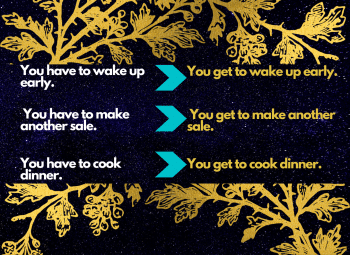Where cravings come from
“A craving is just a specific manifestation of a deeper underlying motive.”
“Your brain did not evolve with a desire to smoke cigarettes or to check Instagram or to play video games. At a deep level, you simply want to reduce uncertainty and relieve anxiety, to win social acceptance and approval, or to achieve status.”
“…there are many different ways to address the same underlying motive. One person might learn to reduce stress by smoking.. another.. by going for a run. Your current habits are not necessarily the best way to solve the problems you face; they are just the methods you learned to use. Once you associate a solution with the problem you need to solve, you keep coming back to it.”
How To Reprogram Your Brain To Enjoy Hard Habits
“…our behavior is heavily dependent on how we interpret the events that happen to us, not necessarily the objective reality of the events themselves.”
You don’t “have” to. You “get” to.

A shift in perspective from being obliged to do something versus canalising your being in loving the task at hand will make you enjoy the process. You transition from seeing these behaviors as burdens and turn them into opportunities.
I once heard a story about a man who uses a wheelchair. When asked if it was difficult being confined, he responded, “I’m not confined to my wheelchair- I am liberated by it. If it wasn’t for my wheelchair, I would be bed-bound and never able to leave my house.”
This shift in perspective completely transformed how he lived each day.
Meditation
The meditation example is incredible in this chapter. Coming from “I’m having distracting thoughts” and going to “meditation is a practice of bringing your attention back, so more distracting thoughts equals more opportunity for practice“ was really good for not thinking of having thoughts as failures.









Comments & Discussion
22 COMMENTS
Please login to read members' comments and participate in the discussion.